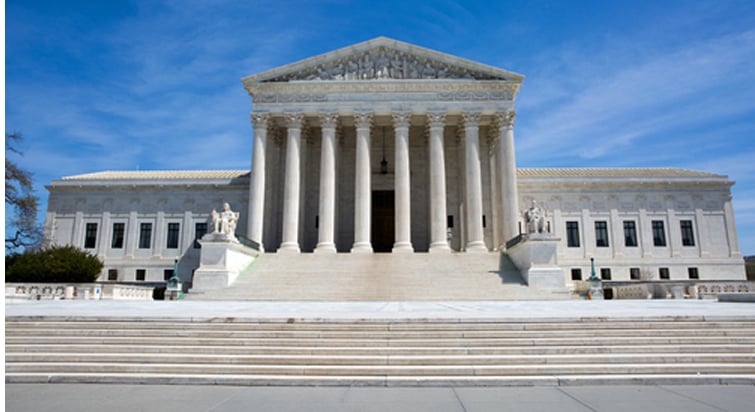Supreme Court blocks eviction moratorium, cites lack of CDC authority

Images by Shutterstock.
The U.S. Supreme Court on Thursday blocked the latest federal ban on evictions, siding with real estate groups that argued the Centers for Disease Control and Prevention exceeded its authority by imposing the moratorium during the COVID-19 pandemic. Justices Stephen Breyer, Elena Kagan and Sonia Sotomayor dissented.
In the unsigned eight-page majority opinion, the court said it would be different if Congress had authorized the CDC’s actions.
“But that has not happened,” according to the opinion. “Instead, the CDC has imposed a nationwide moratorium on evictions in reliance on a decades-old statute that authorizes it to implement measures like fumigation and pest extermination.
“It strains credulity to believe that this statute grants the CDC the sweeping authority that it asserts.”
The New York Times, SCOTUSblog, CNN, Politico and the Wall Street Journal have coverage.
The Alabama Association of Realtors and Georgia Association of Realtors were among the groups challenging the CDC’s moratorium, arguing that they had been burdened by billions of dollars in debt.
The new moratorium went into effect on Aug. 3 after Congress failed to extend an earlier version. It relies on the Public Health Service Act and applies only in counties experiencing high levels of coronavirus transmission, which currently includes about 91% of U.S. counties.
Judge Dabney Friedrich of the U.S. District Court for the District of Columbia refused to block the moratorium on Aug. 13, saying she was bound by previous U.S. Court of Appeals for the D.C. Circuit and Supreme Court decisions that allowed the earlier federal eviction moratorium to remain in place pending an appeal on the merits.
However, Friedrich also expressed doubt in her order that the moratorium would survive on appeal.
In its decision on Thursday, the Supreme Court noted that Justice Brett Kavanaugh provided the fifth vote that let an earlier version of the moratorium stand in June. He said then that the CDC’s actions exceeded its statutory authority but believed the federal ban on evictions should continue until its July 31 expiration to allow for continued distribution of rental assistance funds.
“As harm to the applicants has increased, the Government’s interests have decreased,” according to the majority opinion, which Kavanaugh joined. “Since the District Court entered its stay, the Government has had three additional months to distribute rental-assistance funds to help ease the transition away from the moratorium.
“Whatever interest the Government had in maintaining the moratorium’s original end date to ensure the orderly administration of those programs has since diminished.”
The court also said that while it recognizes the public has a strong interest in stopping the spread of the Delta variant, “our system does not permit agencies to act unlawfully even in pursuit of desirable ends.”
“The government must move past failed policies and begin to seriously address the nation’s debt tsunami, which is crippling both renters and housing providers alike,” Bob Pinnegar, the president of the National Apartment Association, told the New York Times after the court issued its ruling.
Dissent raises doubts about claimed limits to CDC authority
Justice Breyer pointed out in his dissent that it isn’t “demonstrably” clear that the CDC lacks the authority to issue an eviction moratorium that is “substantially more tailored” than its earlier nationwide moratorium.
Instead, he said that the Public Health Service Act’s first sentence—which permits regulations needed to prevent the introduction, transmission and spread of communicable diseases—gives the CDC the power to design measures, including eviction moratoria, that can help stop diseases like COVID-19.
“When Congress enacted §361(a), public health agencies intervened in the housing market by regulation, including eviction moratoria, to contain infection by preventing the movement of people,” Breyer wrote. “If Congress had meant to exclude these types of measures from its broad grant of authority, it likely would have said so.”
Breyer also said the public is not served by “the spread of disease or a court’s second-guessing of the CDC’s judgment.” He cited data from the agency, which expects people who are evicted and forced to share housing to face an up to 30% increased risk of contracting COVID-19.
“The public interest strongly favors respecting the CDC’s judgment at this moment, when over 90% of counties are experiencing high transmission rates,” Breyer wrote. “That figure is the highest it has been since at least last winter. It was in the single digits when we considered the CDC’s previous moratorium order and denied applicants’ earlier motion.”
Breyer said the CDC’s eviction moratorium should not be set aside in a summary proceeding and called on the court to consider the real estate groups’ questions through full briefing and argument.
Jen Psaki, the White House press secretary, said in a statement on Thursday that the Biden administration is disappointed by the Supreme Court’s decision.
“As a result of this ruling, families will face the painful impact of evictions, and communities across the country will face greater risk of exposure to COVID-19,” Psaki said. “President Biden is once again calling on all entities that can prevent evictions — from cities and states to local courts, landlords, Cabinet Agencies — to urgently act to prevent evictions.”
The New York Times reports that only about $5.1 billion of the $46.5 billion in federal funding meant for people who are behind in rent because of the pandemic and its related economic hardship had been distributed by the end of July.
Write a letter to the editor, share a story tip or update, or report an error.


